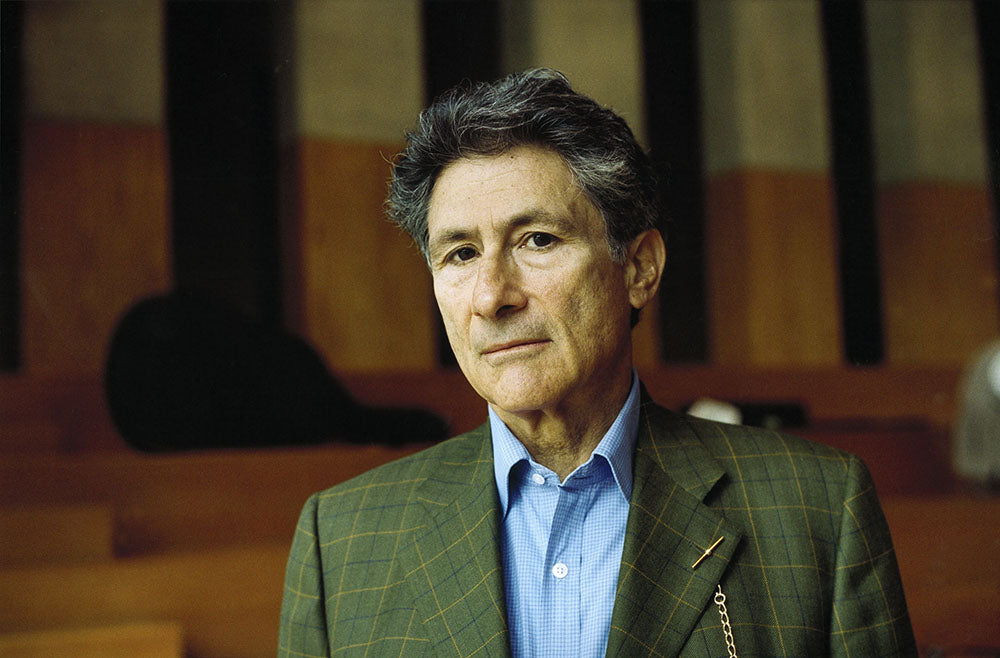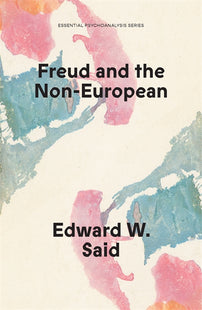Freud and the Non-European
In this excerpt from Freud and the Non-European, Edward Said describes his method of situating historic thinkers and writers “contrapuntally.”

Banned by the Freud institute in Vienna, this controversial lecture eventually became Edward Said’s final book. Freud and the Non-European builds on Said’s abiding interest in the psychoanalyst’s work to examine Freud’s assumption that Moses was an Egyptian and from there explore the limits of identity. Such an unresolved, nuanced sense of identity, Said argues, might one day form the basis for a new understanding between Israelis and Palestinians.
Freud and the Non-European is one of the core texts on our student reading lists and 50% off for the month of September as part of our Back to University sale. See all our Psychoanalysis reading here.
Here we present an excerpt:
I feel I should add something else here. I have often been interpreted as retrospectively attacking great writers and thinkers like Jane Austen and Karl Marx because some of their ideas seem politically incorrect by the standards of our time. That is a stupid notion which, I just have to say categorically, is not true of anything I have either written or said. On the contrary, I am always trying to understand figures from the past whom I admire, even as I point out how bound they were by the perspectives of their own cultural moment as far as their views of other cultures and peoples were concerned. The special point I then try to make is that it is imperative to read them as intrinsically worthwhile for today's non European or non-Western reader, who is often either happy to dismiss them altogether as dehumanizing or insufficiently aware of the colonized people (as Chinua Achebe does with Conrad's portrayal of Africa), or reads them, in a way, "above" the historical circumstances of which they were so much a part.
My approach tries to see them in their context as accurately as possible, but then - because they are extraordinary writers and thinkers whose work has enabled other, alternative work and readings based on developments of which they could not have been aware–I see them contrapuntally, that is, as figures whose writing travels across temporal, cultural and ideological boundaries in unforeseen ways to emerge as part of a new ensemble along with later history and subsequent art. So, for instance, rather than leaving Conrad's compelling portrait of Leopold's Congo in an archive labelled as the dead-end rubbish bin of racist thinking, it seems to me far more interesting to read Conrad's late-nineteenth-century work as - in all sorts of unforeseen proleptic ways - suggesting and provoking not only the tragic distortions in the Congo's subsequent history but also the echoing answers in African writing that reuse Conrad's journey motif as a topos to present the discoveries and recognitions of postcolonial dynamics, a great part of them the deliberate antitheses of Conrad's work.
Thus –to give a brief pair of examples–you have the radically different responses embodied in Tayib Salih's Mawsim al Hijra illal Shima and V.S. Naipaul's A Bend in the River. These two works couldn't be more different from each other, but both are unimaginable without the structure of Conrad's prior imaginative feat to guide and then push them, so to speak, into new avenues of articulation true to the vision of a Sudanese Arab 's experience in the 1960s and that of a Trinidadian Indian expatriate a few years later. The interesting result is not only that Salih and Naipaul depend so vitally on their reading of Conrad, but that Conrad's writing is further actualized and animated by emphases and inflections that he was obviously unaware of, but that his writing permits.
Thus later history reopens and challenges what seems to have been the finality of an earlier figure of thought, bringing it into contact with cultural, political and epistemological formations undreamed of by–albeit affiliated by historical circumstances with–its author. Every writer is, of course, a reader of her or his predecessors as well, but what I want to underline is that the often surprising dynamics of human history can–as Borges’ fable of Pierre Menard and the Quixote so wittily argues–dramatize the latencies in a prior figure or form that suddenly illuminate the present. The horribly attenuated and oppressed black porters and savages that Conrad portrays in terms that Achebe finds so objectionable not only contain within them the frozen essence that condemns them to the servitude and punishment Conrad sees as their present fate, but also point prophetically towards a whole series of implied developments that their later history discloses despite, over and above, and also paradoxically because of, the radical severity and awful solitude of Conrad's essentializing vision.
The fact that later writers keep returning to Conrad means that his work, by virtue of its uncompromising Eurocentric vision, is precisely what gives it its antinomian force, the intensity and power wrapped inside its sentences, which demand an equal and opposite response to meet them head on in a confirmation, a refutation, or an elaboration of what they present. In the grip of Conrad's Africa, you are driven by its sheer stifling horror to work through it, to push beyond it as history itself transforms even the most unyielding stasis into process and a search for greater clarity, relief, resolution or denial. And of course in Conrad, as with all such extraordinary minds, the felt tension between what is intolerably there and a symmetrical compulsion to escape from it is what is most profoundly at stake–what the reading and interpretation of a work like Heart of Darkness is all about. Texts that are inertly of their time stay there: those which brush up unstintingly against historical constraints are the ones we keep with us, generation after generation.
Freud is a remarkable instance of a thinker for whom scientific work was, as he often said, a kind of archaeological excavation of the buried, forgotten, repressed and denied past. Not for nothing was Schliemann a model for him. Freud was an explorer of the mind, of course, but also, in the philosophical sense, an overturner and a re-mapper of accepted or settled geographies and genealogies. He thus lends himself especially to rereading in different contexts, since his work is all about how life history offers itself by recollection, research and reflection to endless structuring and restructuring, in both the individual and the collective sense. That we, different readers from different periods of history, with different cultural backgrounds, should continue to do this in our readings of Freud strikes me as nothing less than a vindication of his work's power to instigate new thought, as well as to illuminate situations that he himself might never have dreamed of.
Freud and the Non-European is one of the core texts on our student reading lists and 50% off for the month of September as part of our Back to University sale. See all our Psychoanalysis reading here.
[book-strip index="1" style="buy"]
